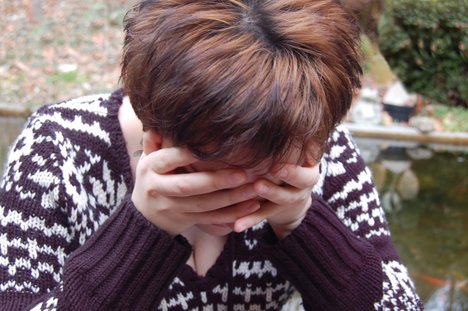Often, when people get exhausted, they feel depressed or easily get upset, on the other hand, when people are depressed, angry, they may feel tired and even exhausted.
For many years, I have seen that a lot of my patients, friends, family members and even myself would have a bad temper and get depressed when we are very tired. If the mental and physical exhaustion lasts and our bodies feel “overdrawn”, there is a possibility that it could lead to depression.
Patient A: I feel exhausted and depressed. I work full time and I’m a single mum. A few years ago, I bought a house. I had to manage everything by myself,to work getting and paying for the mortgage, packing, moving and redecorating the new house. When I moved into the new house, I was too tired even had no energy to appreciate the new house. I felt exhausted and buried myself in the depressing mood. I suffered from stress, anxiety and insomnia. My periods became irregular, it seemed menopause happened to me out of the blue. I felt that everything became meaningless. The pressure of the mortgage was overwhelming and I always got angry with my child. I hated myself, the new house and I regretted that I bought it. (In reality, the new house was very good).
I told her that in Traditional Chinese Medicine, overexertion causes loss of Qi (energy). It is because the physical and mental exhaustion made the Qi (vital energy) become deficient, which caused the depression and other symptoms. Mental and physical health always connect.
Patient B: Because of my son’s death, I immersed myself into the deep grief. I couldn’t get out of bed and had no appetite, no energy to do anything, all I can feel is endless sadness and exhaustion.
I told her that in Traditional Chinese Medicine, excessive sorrow dissipating Qi (energy). Because of the extreme mental trauma, the Qi (vital energy) in our bodies maybe damaged or stagnant and become weaker, which could lead to exhaustion and depression.
Given the two cases above, we can see that exhaustion and depression are co-related and co-existing, one triggers the other one and one affects the other one. Exhaustion reflects the weakness of Qi (vital energy) and blood circulation. When the Qi (vital energy) and blood circulation of the brain becomes deficient, the brains chemicals would lose balance, which would lead to depression. Also, the deficiency of any other parts of the body would also lead to this psychological condition. In modern society, due to exhaustion from physical and mental stress, a considerable number of people are diagnosed with illnesses such as anxiety, depression, high blood pressure, heart disease, diabetes, infertility, impotence, irregular menstruation and irritable bowel syndrome even cancer.
What can we do?
- Take a rest before you get exhausted, otherwise, you are overspending the energy and over using your body.
- Drink before you get thirsty. Do not drink too much coffee to borrow energy.
- Try to figure out the reason when you start feeling worried, depressed and stressed and than avoid it.
- Appropriate good diet. Trying to lose weight too fast sometimes can weaken the Qi (vital energy) and you might also can feel mentally stressed .
- Sleep before you get too sleepy. From Traditional Chinese Medicine point of view, the night belongs to Yin (as in Yin and Yang philosophy), Yin is static. Therefore, night is the time for us to replenish the Qi and blood circulation, and to get rid of exhaustion. Inadequate sleep could weaken the Qi and blood circulation, decrease the oxygen in the brain and dehydrate the body. If we still have to work and study hard the following day, our Qi gets more deficient.
- Eat before you get too hungry. Make sure to have meals on time. When we feel hungry, the sugar level in our blood drops and the Qi (vital energy) weakens. Bad temper and tension are common. After having some food, the blood sugar level increases, but the Qi (vital energy) may not be replenished straightaway. Our bodies have to spend energy to digest food first, then the Qi can be replenished. In order to adjust the blood sugar level, our body keeps working constantly, which damages the pancreas, and maigth lead to diabetes.
Written by Angela Zhu
© Copyright Angela Zhu November 2017






HJustto say thank you for this interesting article! =) Peace, Joy.
Free knowledge like this doesn’t just help, it promote demcorcay. Thank you.
Always the best conetnt from these prodigious writers.
I really apprecaite free, succinct, reliable data like this.
What libeartnig knowledge. Give me liberty or give me death.
Tip top stuff. I’ll epxcet more now.
Thats not just logic. Thats really snesblie.
Your atricle was excellent and erudite.
Thanks for the isngiht. It brings light into the dark!
I had a flatmate with dseiepsron. She eventually had to go to hospital because of it. At one point she told me I was the best flatmate ever, which made me feel embarrassed coz I only helped her out with some small practical things. I think tho that its the small things that can count most.
This is such a great resource that you are providing and you give it away for free. I enjoy seeing websites that understand the value of providing a prime resource for free. I truly loved reading your post. Thanks!
A good many vaulalbes you’ve given me.
Your cranium must be protecting some very valualbe brains.